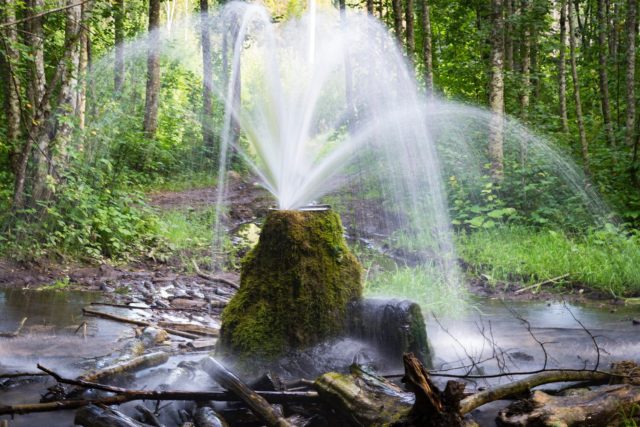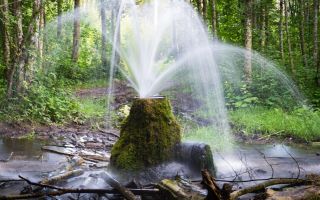Content
Drinking artesian water improves the well-being and functioning of various body systems. However, the product may differ in its characteristics, which should be taken into account. The chemical composition of artesian water depends on the content of various components in the geological strata of the earth's crust. The time of its occurrence, sometimes reaching millions of years, is of great importance. Human-induced environmental pollution cannot be ignored either.
What is artesian water
The Latin name is associated with the French province of Artesium. Water has been actively used on its territory since the 12th century. They have peculiarities of chemical composition. This leads to the presence of useful properties. Thus, the water located in the soil between two layers of different rocks is called artesian water. The mass of the earth contributes to the creation of excess pressure, which allows access to the liquid without the use of specialty pumping equipment.

Occurrence occurs within:
- one geological structure;
- flexure, implying a double zigzag bend of the layers;
- depressions;
- trough, meaning the hoof-like bend of the layers.
Water often flows out of the well with significant pressure, while forming fountains. Springs of this type are usually located at a depth of 100-1000 m. These indicators affect the chemical composition of the product.
How different from any other
In terms of chemical composition, water from artesian wells resembles deep groundwater. They contain almost no organic matter and dissolved oxygen. The difference lies in the depth of the location. Pressure water from wells is sometimes found under several layers. Geological features are essential.
The chemical composition of artesian water
The product is useful when consumed regularly. This is due to the unique composition. Usually, experts note the content of the following components:
- fluorine;
- iron;
- calcium;
- magnesium;
- potassium;
- manganese.
These elements correspond to the earth's crust. The presence of incoming substances depends on the chemical composition of the surrounding layers. It is noteworthy that the complex of elements can be used to judge the geological processes occurring in different periods.
The chemical composition has remained unchanged over the years. It is not dependent on the following factors:
- climate change;
- precipitation;
- floods.
Water reserves from one well can be enough for more than 50 years. The liquid needs to be properly cleaned before use. Otherwise, the product may be harmful.
Why is artesian water useful?
It is known that harmful microorganisms are almost completely absent at a considerable depth.Organic impurities that feed bacteria are also not present. This means that the risk of infection is excluded.
Artesian water brings not only benefits, but also harm. It should not be consumed after being directly extracted from the relevant well. This is due to the presence of chemicals in significant concentrations.
The cleansing process is simple. It allows you to make the resulting artesian water safe, healthy and tasty. Its use contributes to:
- strengthening the skeleton and enamel of the teeth;
- maintaining an adequate mineral composition of lymph and blood;
- normal formation of enzymes and hormones;
- rapid recovery of the body after illness and physical exertion;
- replenishment of the deficiency of nutrients.
Used agricultural fertilizers, sewage and industrial effluents, organic impurities, and soil acids do not enter the artesian water. However, the product can be harmful if not properly cleaned.
Why artesian water is dangerous
The liquid is saturated with salts to a large extent. When using untreated artesian water, kidney pathologies may occur. Before using the product, you should consult a specialist against the background of a history of diseases of the digestive system and heart.
Is hydrogen sulfide dangerous in artesian water
The gas dissolved in water has an unpleasant taste and smell. It is present in artesian water before it is purified and is formed as a result of the vital activity of anaerobic bacteria. The highest concentration of hydrogen sulphide is observed after floods when organic matter seeps into the soil, as well as in case of loss of the required tightness by the well.
The gas is considered extremely poisonous and volatile. It can cause poisoning if inhaled. Drinking artesian water containing hydrogen sulfide can disrupt normal life processes.
How to use correctly
Artesian water benefits the body. Experts recommend using a product marked "Highest Category" or "Natural Mineral". Such names are considered medicinal and contain all the necessary trace elements. However, plain purified water can also be drunk without harm to health.
In the absence of contraindications, it is recommended to consume up to 2 liters per day. liquids. It is advisable to drink a glass of purified artesian water every hour. An increase in this amount is possible in case of illness accompanied by fever. The product helps to eliminate toxins, accelerate recovery.
Conclusion
The composition of artesian water is distinguished by the presence of valuable substances that are useful for the human body. The use of a quality product helps to normalize the functioning of various body systems. To avoid unpleasant consequences, you must drink exclusively purified artesian water.

